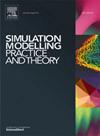A Petri Net-based framework for modeling and simulation of resource scheduling policies in Edge Cloud Continuum
IF 3.5
2区 计算机科学
Q2 COMPUTER SCIENCE, INTERDISCIPLINARY APPLICATIONS
引用次数: 0
Abstract
The emergence of new technologies of 5G/6G networks and the Internet of Things (IoT) drives the transition from traditional Cloud Computing systems to the Edge Cloud Continuum — an interconnected distributed computing environment. Deploying modern applications in such a complex setting poses significant challenges for efficient dynamic resource management. Besides their several benefits, current orchestration platforms disregard aspects such as the dynamic behavior of applications’ demands, heterogeneity of the infrastructure’s resources, and the overall complexity when dealing with interdependent resource allocation decision parameters. The Digital Twin concept envisions assisting application deployments not only by providing offline simulations for experimental assessment in multi-cluster settings but also by actively guiding the orchestration process. In this paper, we aim to provide a modeling and simulation framework to optimize the performance of the underlying infrastructure in terms of resilience and sustainability. We investigate the application of automata theory to model such systems by analyzing their possible states, specifically, using Petri Nets, a mathematical framework for representing discrete event systems, as the primary modeling tool. Therefore, a comprehensive modeling approach is presented to simulate the resource scheduling decisions of an established multi-cluster framework, namely Karmada. Moreover, through this Petri Net modeling approach, we can efficiently optimize the performance of the orchestration process considering the power consumption and workload load balancing of a multi-cluster topology. Extensive evaluation indicates the efficacy of the proposed framework in accurately approximating Karmada’s behavior for various scheduling policies. Also, the proposed framework is capable of assessing the performance of several scheduling policies and guiding the system towards efficient resource management in complex scenarios, exploiting the polynomial complexity of the Petri Net to identify scheduling states.
边缘云连续体中基于Petri网的资源调度策略建模与仿真框架
5G/6G网络和物联网(IoT)新技术的出现推动了从传统云计算系统向边缘云连续体(一种互联的分布式计算环境)的过渡。在如此复杂的环境中部署现代应用程序对有效的动态资源管理提出了重大挑战。除了这些优点之外,当前的编排平台忽略了一些方面,比如应用程序需求的动态行为、基础设施资源的异构性,以及处理相互依赖的资源分配决策参数时的总体复杂性。数字孪生概念设想,不仅通过为多集群设置中的实验评估提供离线模拟,而且还通过主动指导编排过程来协助应用程序部署。在本文中,我们的目标是提供一个建模和仿真框架,以优化基础设施在弹性和可持续性方面的性能。我们研究了自动机理论的应用,通过分析它们的可能状态来建模这样的系统,特别是使用Petri网,一个表示离散事件系统的数学框架,作为主要的建模工具。因此,提出了一种综合建模方法来模拟已建立的多集群框架(即karma ada)的资源调度决策。此外,通过这种Petri网建模方法,我们可以有效地优化编排过程的性能,同时考虑多集群拓扑的功耗和工作负载平衡。广泛的评估表明,所提出的框架在各种调度策略中准确地近似羯摩达行为的有效性。此外,该框架能够评估多个调度策略的性能,并利用Petri网的多项式复杂度来识别调度状态,从而指导系统在复杂场景下进行有效的资源管理。
本文章由计算机程序翻译,如有差异,请以英文原文为准。
求助全文
约1分钟内获得全文
求助全文
来源期刊

Simulation Modelling Practice and Theory
工程技术-计算机:跨学科应用
CiteScore
9.80
自引率
4.80%
发文量
142
审稿时长
21 days
期刊介绍:
The journal Simulation Modelling Practice and Theory provides a forum for original, high-quality papers dealing with any aspect of systems simulation and modelling.
The journal aims at being a reference and a powerful tool to all those professionally active and/or interested in the methods and applications of simulation. Submitted papers will be peer reviewed and must significantly contribute to modelling and simulation in general or use modelling and simulation in application areas.
Paper submission is solicited on:
• theoretical aspects of modelling and simulation including formal modelling, model-checking, random number generators, sensitivity analysis, variance reduction techniques, experimental design, meta-modelling, methods and algorithms for validation and verification, selection and comparison procedures etc.;
• methodology and application of modelling and simulation in any area, including computer systems, networks, real-time and embedded systems, mobile and intelligent agents, manufacturing and transportation systems, management, engineering, biomedical engineering, economics, ecology and environment, education, transaction handling, etc.;
• simulation languages and environments including those, specific to distributed computing, grid computing, high performance computers or computer networks, etc.;
• distributed and real-time simulation, simulation interoperability;
• tools for high performance computing simulation, including dedicated architectures and parallel computing.
 求助内容:
求助内容: 应助结果提醒方式:
应助结果提醒方式:


